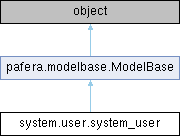User accounts for the system. More...

Public Member Functions | |
| def | __init__ (self) |
| Initialize all fields at creation like a good programmer should. More... | |
 Public Member Functions inherited from pafera.modelbase.ModelBase Public Member Functions inherited from pafera.modelbase.ModelBase | |
| def | __cmp__ (self, o) |
| Comparing means simply subracting the database ids. More... | |
| def | __eq__ (self, o) |
| Two objects are equivalent if their models are the same and their IDs are the same. More... | |
| def | __hash__ (self) |
| We take the easy route where the hash for an object is just its database ID. More... | |
| def | __init__ (self) |
| Initialize all fields at creation like a good programmer should. More... | |
| def | __repr__ (self) |
| Simply outputs the toJSON() function with the model name. More... | |
| def | __str__ (self) |
| Simply calls the toJSON() function. More... | |
| def | CheckPassword (self, field, password) |
| This special function checks to see if the password matches the hash stored in the field. More... | |
| def | GetACL (self, db) |
| Since we store ACLs as a database lookup, be sure to use these getters and setters if you plan on using ACLs. More... | |
| def | HasSameValues (self, o) |
| While operator = only checks class and ids, this checks every field to see if two objects or an object and a dict have the same values. More... | |
| def | OffsetTime (self, timeoffset) |
| Change all datetime fields to the new time offset. More... | |
| def | Set (self, **kwargs) |
| We use this method instead of direct attribute access in order to keep track of what values have been changed. More... | |
| def | SetAccess (self, access) |
| Special security functions that are useful only if you have enabled security in _dbflags for the model. More... | |
| def | SetACL (self, db, acl) |
| ACLs in Pafera are defined as a set of rules similar to cascading style sheets. More... | |
| def | SetGroup (self, groupid) |
| Special security functions that are useful only if you have enabled security in _dbflags for the model. More... | |
| def | SetOwner (self, ownerid) |
| Special security functions that are useful only if you have enabled security in _dbflags for the model. More... | |
| def | SetPassword (self, field, password) |
| This special function hashes the password before saving the field. More... | |
| def | ToJSON (self, fields='') |
| Converts this object into a format suitable for inclusion in JSON. More... | |
| def | UpdateFields (self, fieldnames) |
| This is a convenience method to update fields without going through the Set() method. More... | |
Additional Inherited Members | |
 Public Attributes inherited from pafera.modelbase.ModelBase Public Attributes inherited from pafera.modelbase.ModelBase | |
| d | |
| dbaccess | |
| dbacl | |
| dbaclid | |
| dbgroup | |
| dbowner | |
| id | |
 Static Public Attributes inherited from pafera.modelbase.ModelBase Static Public Attributes inherited from pafera.modelbase.ModelBase | |
| list | SECURE_FIELDS |
Detailed Description
User accounts for the system.
Handles logins, uploads, storage quotas, access tokens, and the such.
Pafera adds a place field to the traditional username/password combination, both for added security and to allow different places to use the same phone number for their own accounts. It's the unique combination of (phonenumber, place, password) that identifies a particular user.
Note that displayname is a translation field, meaning that that a user can have their own names in different languages.
expiredate is when the user account will expire. Set it far into the future for your own administrator account.
canmanage and managedby are used for managed accounts such as students being managed by a teacher. Managed accounts cannot change anything besides change their own password.
accesstokens are used by the system to allow APIs to assume the identity of a user. The APIs used must be explicitly specified for the token to work. The token format is a dict such as { "token": tokenvalue, "expiredate": timestamp, "apilist": [ '/system/fileapi:search', '/system/fileapi:load', '/system/fileapi:save' ] }
Constructor & Destructor Documentation
◆ __init__()
| def system.user.system_user.__init__ | ( | self | ) |
Initialize all fields at creation like a good programmer should.
Reimplemented from pafera.modelbase.ModelBase.
The documentation for this class was generated from the following file:
- /srv/flasksite/apps/system/user.py